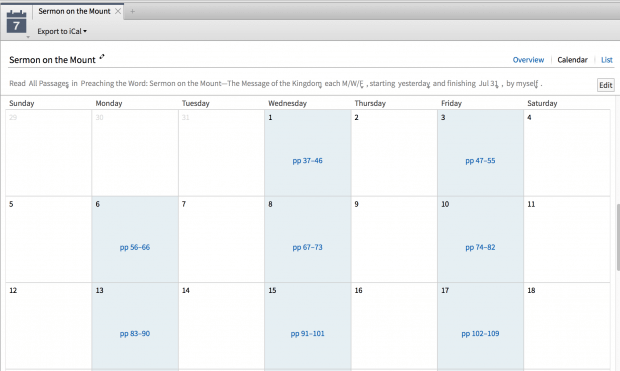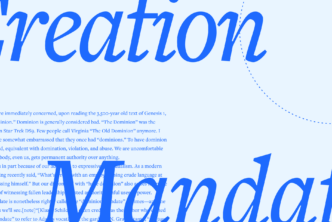I remember the first time my personal devotions finally started to click. After growing up in the church, earning a Bible degree, and working in ministry, I developed the habit of separating my “study time”—which I spent preparing sermons, lessons, and Bible studies—from my own “personal devotions.”
For my “study,” I used resources like commentaries, biblical encyclopedias, systematic theologies, and lexicons; for my “personal devotions” I used resources like an open Bible, pen, paper, and a journal.
Then I picked up John Stott’s commentary on Romans and my personal devotional habits changed all at once. Stott’s insights were so enlightening, his prose so beautiful, and his application so practical, I found myself devouring his words outside of my “study time.” I was writing notes in the margins and filling notebooks with insights. In short, my “study time” began to creep into my “personal devotion” time.
And I haven’t looked back since.
I still endorse the idea of Christians sitting down for serious study—using sound hermeneutical principles and solid Bible study resources to tackle a particular problem or passage. But for most of us, the bulk of our Bible study will be devotional—regular reading and study for personal, spiritual growth. And my experience with John Stott’s commentary on Romans gave me this delightful surprise: Commentaries are excellent resources for breathing life back into your personal devotions.
If you prepare sermons or Bible studies every week, but struggle to read the Bible for your own spiritual growth—or if you want to help those in your care get more out of their devotional time—consider these five tips for using commentaries in your personal devotions.
Use a commentary like a daily devotional
Daily devotionals (like the classic My Utmost for His Highest) are great resources to help you maintain a consistent quiet time, especially when those devotionals are tied to specific passages of Scripture or work progressively through a section of Scripture. They provide a sense of accountability and a clear structure for reading the Bible regularly.
But don’t limit yourself to devotionals. Because commentaries follow the biblical text so closely, they can be used in the same way you’d use a devotional. With commentaries, you can regularly read digestible chunks of text alongside a corresponding passage of Scripture. Plus, good commentaries have the added benefit of going more in-depth with any given passage of Scripture than the average devotional.
A great way to start using commentaries this way is with a customized reading plan that pairs your commentary with your favorite Bible translation. I recently set up a reading plan using Kent Hughes’ commentary on the Sermon on the Mount and the ESV. Whether you’re using Logos or not, the principles for setting up your reading plan are the same.
Start by setting a realistic goal for your devotional time. Reading the Bible every day is a great goal, but, contrary to popular belief, the eleventh commandment is not “Thou shalt read the Bible every single day or else live in perpetual, suffocating guilt.”
If you set a goal of reading the Bible and your favorite commentary devotionally three days a week, great. Realistic goals you’ll actually reach are better than grandiose goals you’ll always fall short of.
I decided a realistic goal for me is to study the Sermon on the Mount alongside Hughes’ commentary three days a week. Using Logos, I set up a reading plan for Mondays, Wednesdays, and Fridays. Hughes’ commentary is about 280 pages long, so I figured 9–10 pages of reading per session is a good goal.
That has me finishing up my study of the Sermon on the Mount in about two months. This is a resolution I can actually keep!
Remember you don’t have to read every single word in a commentary
Sometimes it’s worth the extra effort to understand a small exegetical detail; other times, it’s appropriate to seek out the main gist and the key principles of a passage. I’m not suggesting you leave sound Bible study principles behind just because you’re reading for your “spiritual growth”; every passage should be understood in context and you should take care not to read your own views and bias into the text.
But that doesn’t mean you have to read every word in a commentary. Don’t get lost in technical discussions, unless doing so will help you understand something essential to sound interpretation or application.
Take advantage of the section breaks that are in the commentary you’re using. Many commentaries (such as the Baker Exegetical Commentary on the New Testament) will give you an overview of the passage, then include more technical discussion in verse-by-verse notes. Depending on the purpose of your study, it might not make sense to get lost in the weeds of some text-critical issue. It’s okay to prayerfully study the sections that are most relevant to your goals.
Skim the commentary first, then circle back for details
This is good advice in general, but it’s especially important when you’re focused on study for spiritual growth. Get the bird’s eye view of both the passage and the commentary on that passage; skim, or read the whole thing, but be sure to highlight what strikes you. When you circle back, you can dig in more deeply. And if you’re using Logos, your highlights are all saved; you can even turn on a Visual Filter that shows you all your highlights in a convenient list. That way you can easily reflect on what struck you as most important as you skimmed the text.
As above, I’m eager to point out that you should always use sound Bible study principles. This skim approach shouldn’t be a substitute for dealing responsibly with the text. Keep in mind the three steps of inductive Bible study: observation, interpretation, and application. (And if you’re looking for some training on how to use that method, I recommend trying our free 10-day Bible study training course).
Take notes on the commentary and the biblical passage
If you’re like me, you need to take notes to wrestle down those flashes of insight as soon as they emerge. If I don’t capture my thoughts as soon as they arise, they float off into the ether never to return again.
When studying for spiritual growth this is even more important. Maybe you’re working through the inductive Bible study method (observation, interpretation, and application) and a thought of application strikes you while you’re still in the observation stage. Just jot it down; flag it and come back to it later. Don’t lose that insight to the foggy ruins of time.
Use a commentary to write a sermon (or at least a sermon outline) to yourself
When I was in ministry, my personal devotions were, frankly, a struggle. I was preparing as many as three sermons or lessons a week. I was in the Word constantly, but I was fatigued by the functional purpose of my study; studying the Bible became a chore—a means to an end. When I read the Bible to solely focus on my own growth, the last thing I wanted to do was pull out biblical resources. I just wanted to sit there with my Bible open and hear from the Lord. I was exhausted.
But as a result, my personal study often felt fruitless. When I prepared a sermon of lesson, I walked away from my study with clear, cogent points for my hearers and a sense of accomplishment. When I finished my personal devotions, I often walked away with no clear sense of application . . . and a vague sense of failure.
The most valuable time I spent in God’s Word was when I summarized the insights I learned and then asked myself If this was a sermon, what application points would I write down. How would I convey this to my listeners?
This is where commentaries come in. A good commentary can be a trusty companion when you’re preparing these personal mini-sermons. You don’t have to consult every commentary in your library. Just rely on one you find especially insightful; highlight, and take a few notes. Then summarize what you’ve learned.
The great thing about this approach: I already know my struggles, sins, and the things God has been laying on my heart. Distilling the insights I’ve gleaned while consulting my Bible and commentary is a great way to be sure I walk away from my devotional time with clear application in mind. Thinking of the product of my personal devotions as a mini-sermon for myself gives me a clear goal and framework for my quiet time.
But be sure you pick the right commentary . . .
Not all commentaries are created equal. If you’re picking a commentary specifically to fuel your spiritual growth, a technical commentary based on the original languages (like one of my personal favorites, the NIGTC) might not be the best choice.
Whole-Bible commentaries
If you plan on reading larger chunks of Scripture (getting a view of the forest before examining every leaf on every tree) a single-volume, whole-Bible commentary is a great choice. Because such commentaries cover every book in the Bible in a necessarily small amount of space, they usually focus on key themes and the broad contours of a passage—perfect for understanding the flow of larger sections of Scripture.
For a good whole-Bible commentary, I recommend the New Bible Commentary. Co-edited by D.A. Carson, this commentary incorporates modern scholarship while maintaining a high view of Scripture’s authority.
Homiletical commentaries
To a large extent, the process of solid sermon prep is identical to good Bible study. Because homiletical (or “preaching”) commentaries are designed especially for sermon prep, they provide a clear idea of how to apply passages to your life. Generally, these commentaries are based on the author’s own sermons, which makes them lively, readable and practical—perfect for devotional reading. I set up my Sermon on the Mount reading plan with Kent Hughes’ commentary from Crossway’s Preaching the Word series.
Devotional and “popular” commentaries
The goal of this type of commentary and the goal of your personal devotions are identical: your personal, spiritual growth. They are often shorter than more technical commentaries, include fewer detailed discussions of minor issues, and tend to focus on application and major themes in the text. N.T. Wright’s New Testament for Everyone series falls somewhere between a “popular” commentary and a devotional commentary. Wright is excellent at distilling complex, technical issues down to a few key takeaways, making this commentary set ideal for personal devotional study.






